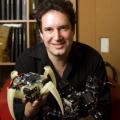GECCO 2017 offers the following 3 enticing keynotes lectures.

Francesca Ciccarelli
School of Cancer Science, King’s College London & The Francis Crick Institute, London UKKeynote 1 - Computational approaches in cancer genomics
Abstract:
Large-scale cancer genome projects provide an extraordinary mine of molecular information on a vast range of cancer types and samples and offer the exciting potential of understanding the molecular mechanisms of cancer. Much knowledge is however still hidden in the data and this significantly reduces the effective contribution of cancer molecular profiling to the personalised medicine agenda. In my lecture I will review some of the technical, analytical and scientific challenges in cancer genomic data analysis. I will also provide examples of how this type of analysis can contribute effectively to unravel cancer driver mechanisms and potential targets for anti-cancer therapy.
Biosketch
Francesca Ciccarelli is Associate Professor of Genomics and Bioinformatics at King's College London and Group Leader of the Cancer Systems Biology Group at The Francis Crick Institute in London. Francesca graduated in pharmaceutical chemistry at the University of Bologna and was awarded with a PhD in Natural Science from the University of Heidelberg. She was trained as a computational biologist under the supervision of Peer Bork at the EMBL. In 2005, she started her research group at the European Institute on Oncology in Milan focusing on cancer genomics, with a particular interest in gastrointestinal cancer. In 2014, she moved to London to work in the Cancer Division of King’s College, where she also coordinates the qGEB (quantitative Genomics, Epigenomics and Biobank) programme. Francesca’s group uses a combination of computational and experimental approaches to analyse cancer omic data and predict patient-specific cancer drivers, identify cancer vulnerability, and rebuild tumour evolution in space and time.
Keynote 2 - Evolving brains in evolving environments
Abstract:
The spectacular and headline-grabbing recent successes in deep learning have made little or no use of evolutionary algorithms. Has this left Darwin turning in his grave, like one of the Earthworms he was so fond of studying? Or is he flying high, like a Galapagos Finch, safe in the knowledge that the inferior land-borne creatures below him will soon reach the edge of their harsh island and realize that, to go any further without drowning, they will need evolution?
We will discuss and illustrate two ways in which evolution may be on the critical path to Artificial General Intelligence, AGI. On the environment side, highly connected ecosystems of evolving agents — such as the environments within which our own intelligence evolved — may provide a ‘natural curriculum’ that naturally optimizes the nature and magnitude of the learning challenge presented to each of the agents in those ecosystems. If so, simulations of virtual ecosystems could become an efficient engine of innovation in AI. On the brain side, evolutionary algorithms and deep learning interact in various ways, e.g. searching over hyperparameters, copying weights in neural networks can contribute to continual learning, evolution can control which parts of giant neural networks learn, neural networks can learn mutation operators, reward functions can be evolved, and diversity maintenance mechanisms can be applied to reinforcement learning.
Biosketch
Dr. Drew Purves' research journey began in his teenage years when he became interested in the the nascent field of Artificial Life. This led him to study real Ecology at Cambridge, before doing a PhD in Ecological Modelling at the University of York, and a postdoc at Princeton, before moving on to lead the Computational Ecology and Environmental Science group at Microsoft Research, Cambridge. Along the way, Drew became increasingly obsessed with developing complex ecological models that were nonetheless constrained rigorously against data using Bayesian methods. Many models, papers and software prototypes later, he jumped at the chance to join DeepMind, where is attempting to draw on all his his experience to help create Artificial General Intelligence.Dr. Chrisantha Fernando studied medicine at Oxford before realizing it was more fun to do evolutionary and adaptive systems at COGS in Sussex. He did his PhD mainly on the origin of life, which culminated many years later in a nice paper about soap bubbles ("Evolution before Genes"). In 2008 Chrisantha and Eors Szathmary started working on the crazy idea of things replicating in the brain, and in 2015 Chrisantha joined DeepMind to work on combining evolution and learning at the algorithmic level. He is interested in continual learning in giant neural networks that combine the population based search principles of evolutionary computation with gradient based deep learning, which he believes is one of the lampshades of artificial general intelligence.
Keynote 3 (SIGEVO Chair Lecture) - Curious and Creative Machines
Abstract:
Can machines ask questions and generate hypotheses? Despite the prevalence of big data, the process of distilling data into scientific laws has resisted automation. Particularly challenging are situations with small amounts of data that is difficult or expensive to collect, such as in robotics and other physical sciences. This talk will outline a series of recent research projects, starting with self-reflecting robotic systems, and ending with machines that can formulate hypotheses, design experiments, and interpret the results, to discover new scientific laws. We will see examples from geology to cosmology, from classical physics to modern physics, from big science to small science.
Biosketch
Hod Lipson is a professor of Engineering and Data Science at Columbia University in New York, and a co-author of the award winning book “Fabricated: The New World of 3D printing”, and “Driverless: Intelligent cars and the road ahead”. His work on self-aware and self-replicating robots challenges conventional views of robotics. Lipson directs the Creative Machines Lab, which pioneers new ways to make machines that create, and machines that are creative. For more information visit http://hodlipson.com


